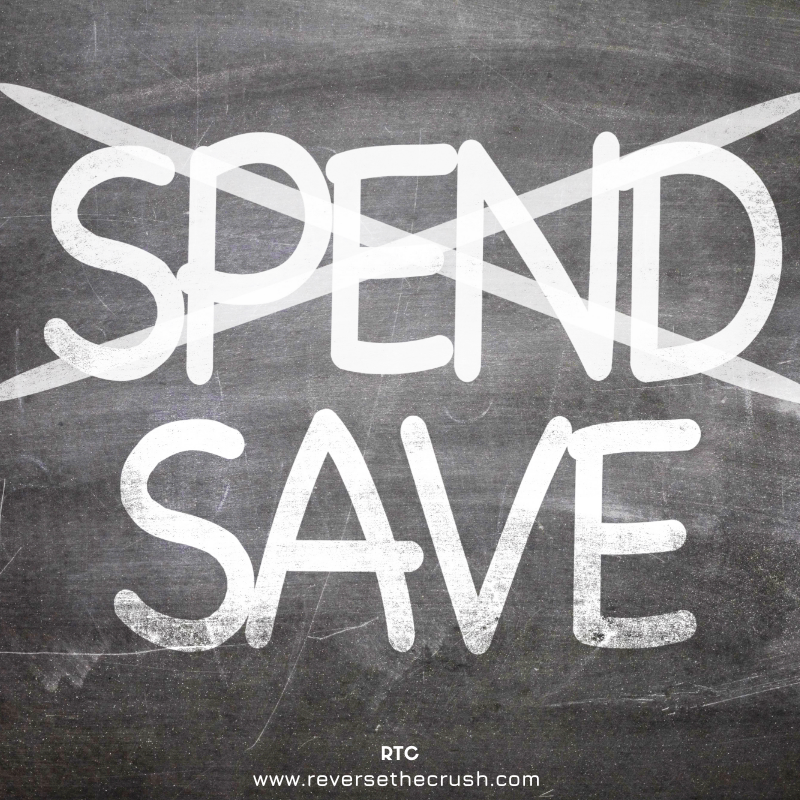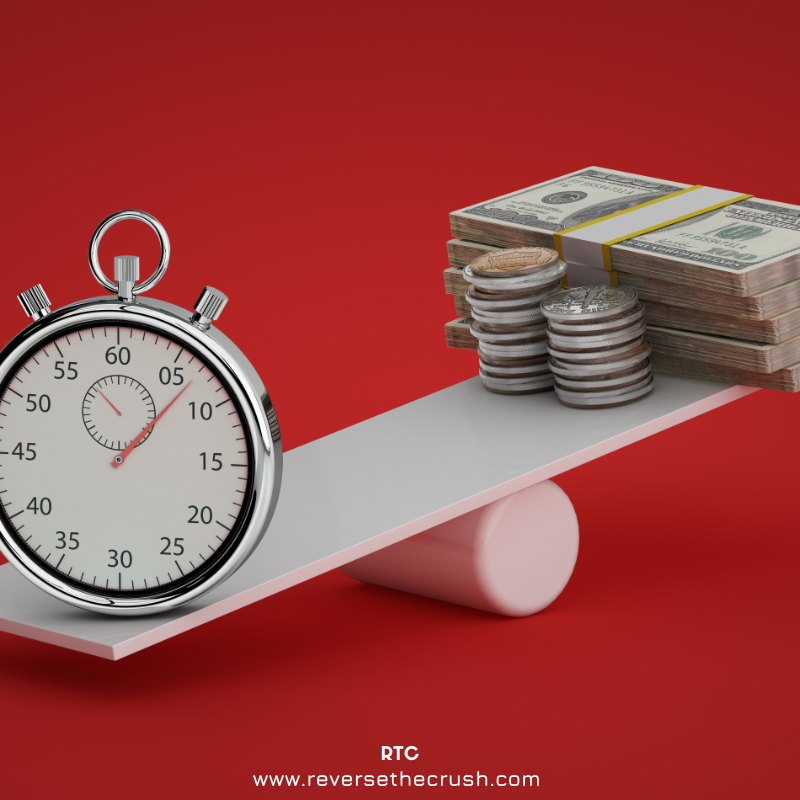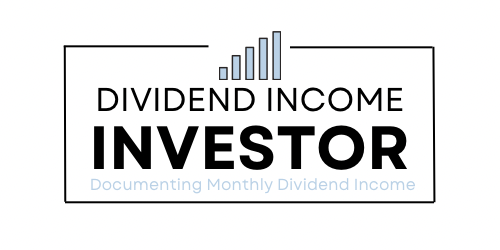Saving vs debt payoff: Failing to pay off debt will cost more. But not saving means you’ll never build wealth. Here’s 11 reasons to do both.
Have you ever wondered if putting all your money towards debt repayment is the best thing to do?
The simple math and your financial advisor might suggest paying off debt first. However, there are many disadvantages to not saving money.
In this post, I will discuss the concept of saving vs debt payoff, and I will give my personal opinion on if you should save money or pay off debt.
Let’s get started.
Saving vs Debt Payoff: Should You Save Money or Pay Off Debt?
You should do both.
Contrary to Dave Ramesy’s advice to pay off debt first, I believe that you should pay yourself first while paying off debt.
In my personal opinion, you should always save money regardless of the amount of debt you have.
However, the amount of debt should dictate the amount you save.
If you have debt, you should only save the bare minimum required to fund your retirement. In that situation, you could pay yourself first ten to fifteen percent of your income. The rest can go towards paying off debt.
Why Both?
Simply put, unless your income is immense, you will never be wealthy unless you start investing early.
Compound interest is how to build wealth if you earn a middle class income.
Sure, you will pay less interest if you pay off your debt first. But you will earn less compound interest if you start investing late.
In addition, it makes sense to save and invest if your investment returns are greater than the interest rate on your debt. To illustrate my point, check out this YouTube video by Graham Stephan. In the video, Graham analyzes a 41-year old Doctor’s income, debt, investments and spending. It turns out this Doctor earning 75k per month still has 80k worth if student loans. Why? Because the interest rate on the loans is much less than the investment returns.
Furthermore, paying off debt without building proper saving habits leads to more debt. Most people feel so good about paying off debt, they just rack it up all over again to reward themselves.
Most of all, though, saving is more important than paying off debt. Here’s 11 reasons why saving money is more important than paying off debt.
1. No Savings Means No Choice
Consider a scenario where two individuals earning the same income are laid off.
Prior to being laid off, individual number 1 was a saver and individual number 2 was focussed on debt repayment. They earned the same salary ($50,000 annually after taxes), and both started off with the same debt ($25,000).
In this scenario, both individuals worked for one full year. Each managed to put 50% (25,000) of their income towards their net worth during the year.
On the day they get laid off, here’s where each stand financially:
Individual #1: He has been consistently saving 30% of his income while steadily paying down debt. He saved $15,000 during the course of the year. The money was invested in the S&P 500, so it earned a 10% return. Now he has $16,500.
As for debt, he’s been making the required payments and has paid off $10,000. So, when individual #1 gets laid off, he owes approximately $15000 to $16,000 (based off whatever interest rate) in debt but has $16,500 in the bank leaving him with a positive net worth.
He’s not too worried about getting laid off because he’s got savings to fall back on. He can afford the minimum payments to keep reducing his debt. He takes his time looking for a job and finds a job he truly enjoys.
Individual #2: He put his entire $25,000 towards his debt and is very proud that he paid it off, until he got laid off. On this day, he realizes that he has no options because he has no money.
Not only is his net worth $0, he also has to go back into debt while he searches for a job. Even worse, he might not even have the credit available since he’s been avoiding credit cards and debt.
Now, he has no job and no one will approve him for a loan. He starts panicking and accepts the first job opportunity that comes his way, even though it makes him miserable.
2. Not Saving Means You’re Unprepared For Opportunities
It’s nice to have money available for opportunities.
Without consistent savings, you are not prepared for opportunities.
If the market corrects and opportunities are everywhere, you’re unprepared if you don’t save.
What about if the housing market takes a dive and that property you’ve had your eye on is ripe for the taking? You must save money to be prepared.
Simply put, saving money sets you up to take advantage of opportunities. Only paying off debt does not.

3. It’s Comforting
Not to sound greedy, but it’s comforting to know you have money in the bank.
You sleep better at night.
You feel more in control of the direction of your life.
It’s just less stressful.
Of course, access to credit is good to have in case of emergencies.
But there’s a different level of comfort that comes along with saving money.
It actually builds confidence.
You feel safer with every dollar saved. Every dollar saved is another dollar away from being broke.
4. Saving Is Rewarding
If you only focus on debt repayment, your net worth will be zero once it’s paid off.
Even after making all that progress you made, it could still feel like you’ve accomplished nothing.
On the other hand, if you save, a day will come when you look at your investments in amazement of how much you have.
It’s progressive and motivating to see your investment’s growth over time.
“Compound interest is the eighth wonder of the world. He who understands it, earns it … he who doesn’t … pays it.” – Albert Einstein
5. Compound Interest
The power of compound interest is grossly misunderstood.
Plus, most people are not patient enough to see through the growth of investments over time. Compound interest is slow early on.
But make no mistake, compound interest is a potent animal in the long term.
Interest on interest eventually snowballs.
Don’t miss out on compound interest because of debt.
6. You Can Do Both
Of course, I’m not suggesting it’s wise to make the minimum payment on your visa and then hoard as much money as possible.
I’m suggesting that you do both – pay yourself first and pay off debt.
It’s certainly possible to do both.
I’ve been saving and building my portfolio for years now, but I’ve also been paying off student loan debt.
If I only paid off my student loan debt instead of saving, I would have missed the opportunity to work from home and this blog might not exist.
Saving provided the seed money to afford to take a year off and switch to part-time work.
7. You Must Acquire Assets
According to Rich Dad Poor Dad by Robert Kiyosaki, it’s a poor person’s mentality to focus on only debt repayment.
Between your mortgage, car payment, kids, and costs of marriage, most people don’t have a chance to own an asset.
Simply put, you will not be wealthy unless you own assets. In Rich Dad Poor Dad, the author explains the difference between the rich and the poor.
“The rich buy assets. The poor only have expenses. The middle class buys liabilities they think are assets. The poor and the middle class work for money. The rich have money work for them.” – Robert Kiyosaki
8. Saving Money Helps You Avoid Debt
Having money in the bank means you’re less likely to rack up debt in the first place.
If you have an emergency fund saved up, the funds are available to cover an emergency repair, or a new laptop if it’s needed for work.
On the other hand, if you don’t have money saved up, the only option is to go into more debt.
9. Build Proper Financial Habits
The ability to save money is not a switch you turn on at a certain age, it’s a habit.
Many folks plan to save once the mortgage is paid off, once the kids move out, when the credit card is paid off, or after the next vacation. Stop lying to yourself.
The only way to save money is to make it a habit. Pay yourself first.
10. Business-Like Approach
The main reason why personal finances are managed differently than corporate finances is because the average person has no idea how to manage money.
Alternatively, businesses use leverage to grow revenue.
In my view, personal finances should not be managed any different, at least early on.
If you are able to slowly reduce debt while earning higher returns than the interest rate on your debt, it makes sense to save and invest at the same time.
Essentially, choosing to save while paying off debt is like managing a business on a smaller, more personal scale.
11. Pay Yourself First
I’ve already alluded to this concept several times in this post, but it’s so important I’m going to say it again: Pay yourself first!
Anyone can build wealth by simply paying themselves a percentage of their income first.
If you only focus on debt repayment, you may never build this key habit.

Saving vs Debt Payoff – Concluding Thoughts
In the saving vs debt payoff debate, the right answer is to do both.
For the most part, those who believe in paying off debt first do not know how to manage money.
If you believe in paying off debt first, in theory, you should pay off your mortgage before saving for your retirement. Debt is debt, right?
But that wouldn’t make sense because it would leave you unprepared for retirement.
Therefore, if you are debating on saving vs debt payoff, consider doing both.
Manage your personal finances like a business by paying yourself an affordable, minimum savings rate first. Use what’s leftover to eliminate debt.
Of course, it’s important to consider what’s best for the individual situation. If the debt is all credit card debt at a 20% interest rate, it might make sense to get rid of it.
On the other hand, it’s possible to save and payoff debt at the same time.
If you can afford to do both, it will lead to better savings habits, the ability to take advantage of opportunities, and more wealth long-term through compound interest.
Related
Pay Yourself First – How to Pay Yourself First
Student Loan Debt – (11) Practical Ways to Quickly Pay It Off
View Yourself as a Business to Save Money
I am not a licensed investment or tax adviser. All opinions are my own. This post may contain advertisements by Monumetric. This post may also contain internal links, affiliate links to BizBudding, Amazon, Bluehost, and Questrade, links to trusted external sites, and links to RTC social media accounts.
Connect with RTC
Twitter: @Reversethecrush
Pinterest: @reversethecrushblog
Instagram: @reversethecrush_
Facebook: @reversethecrushblog
Email: graham@reversethecrush.com


 Dividend Income Update September 2020
Dividend Income Update September 2020
